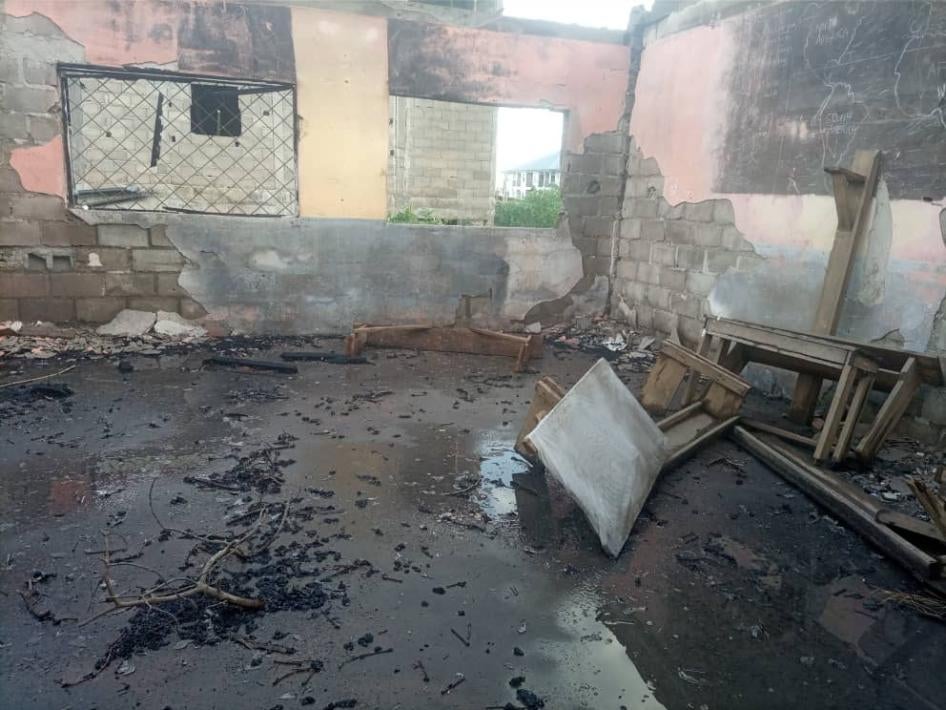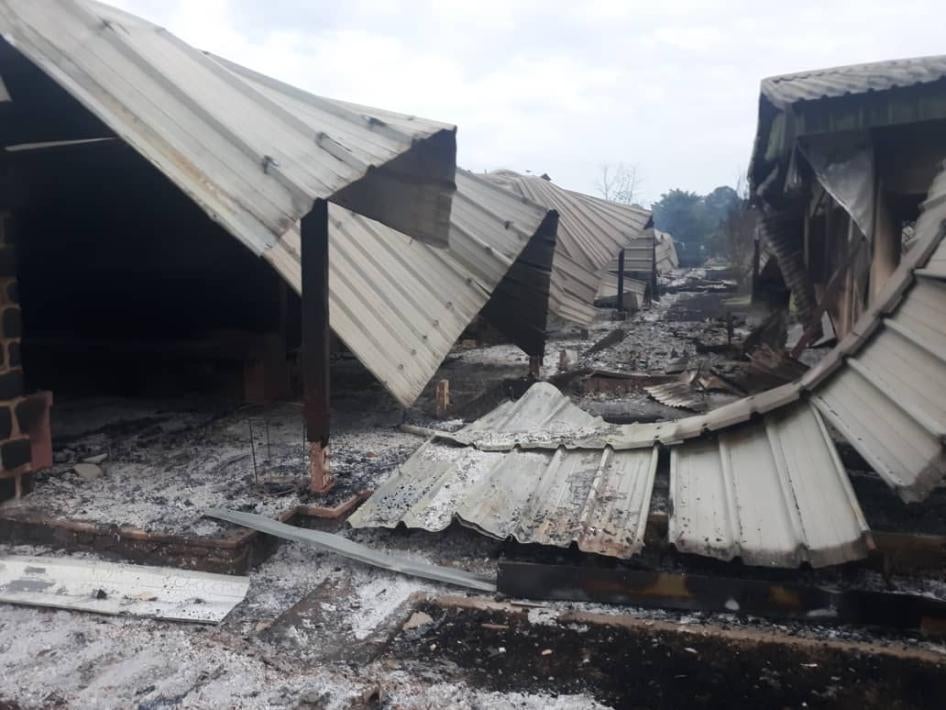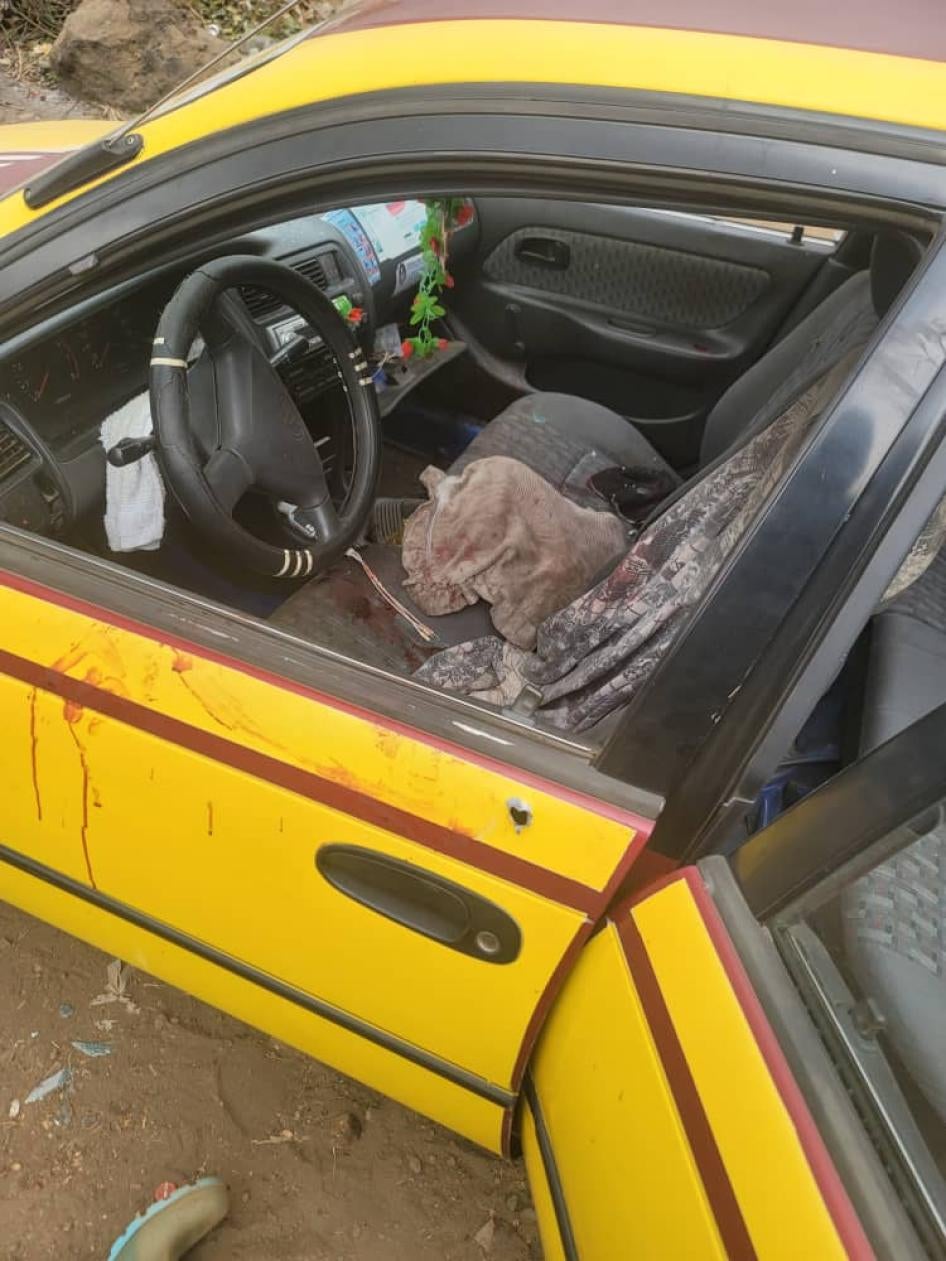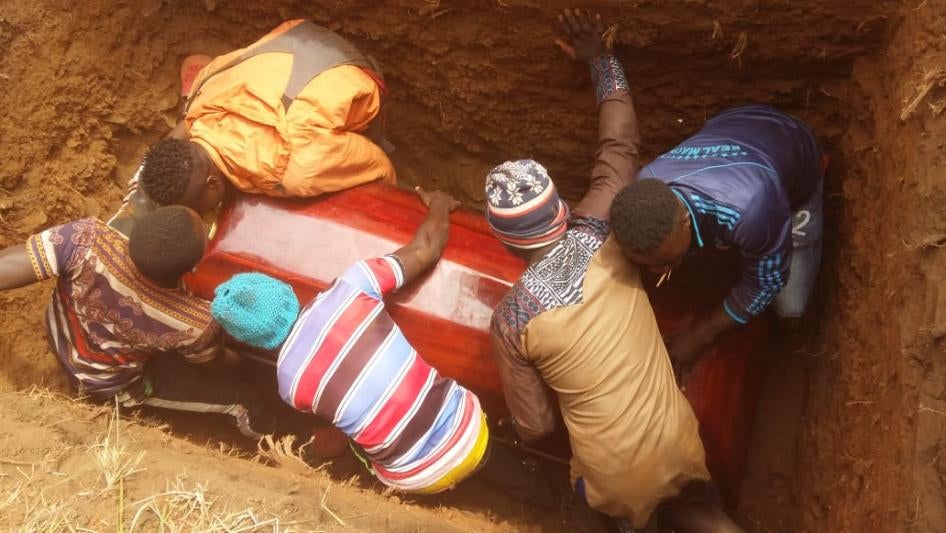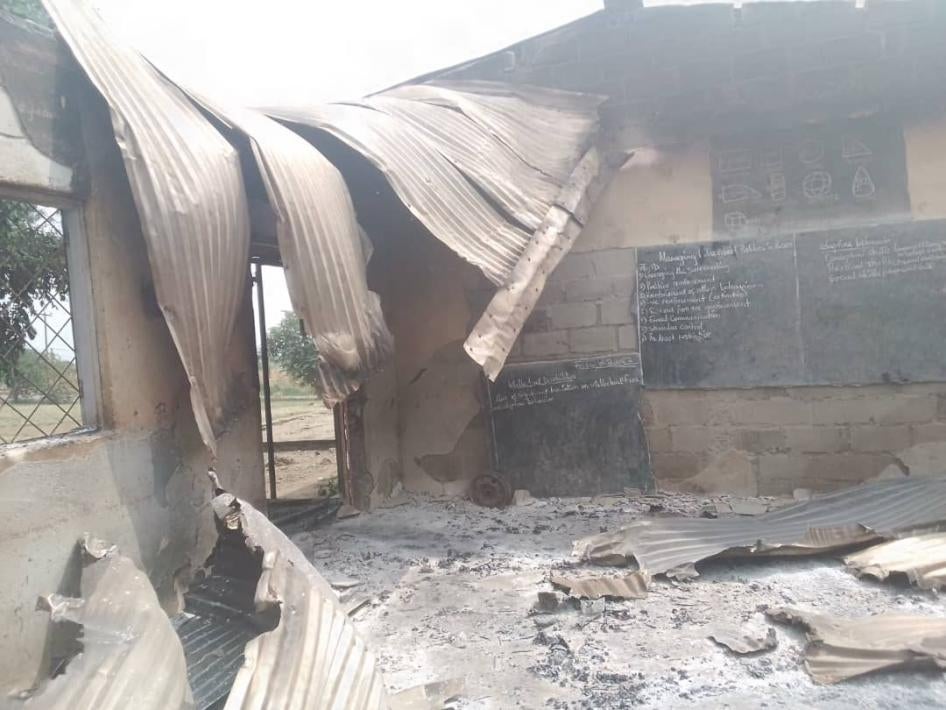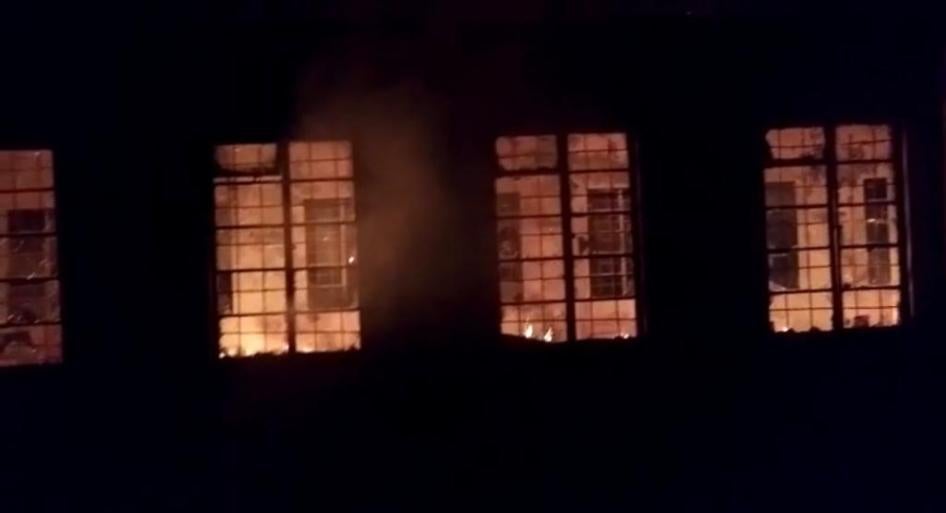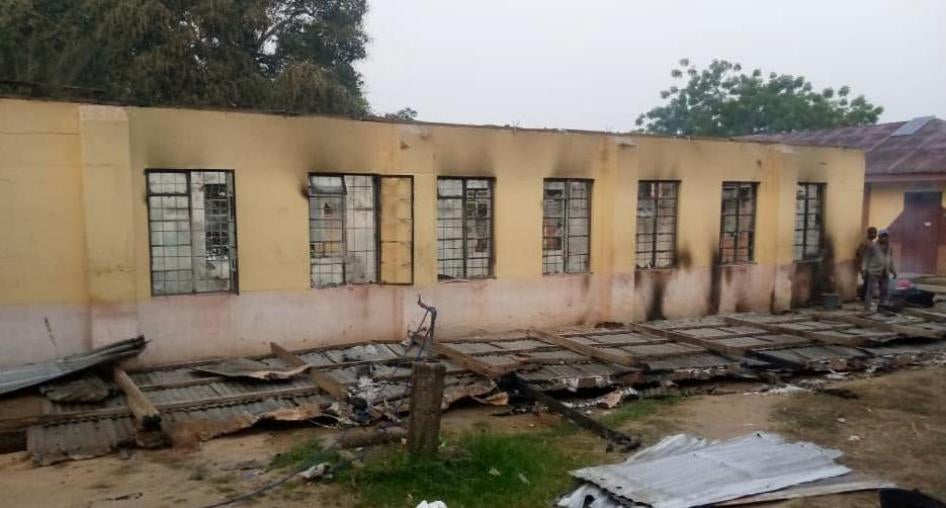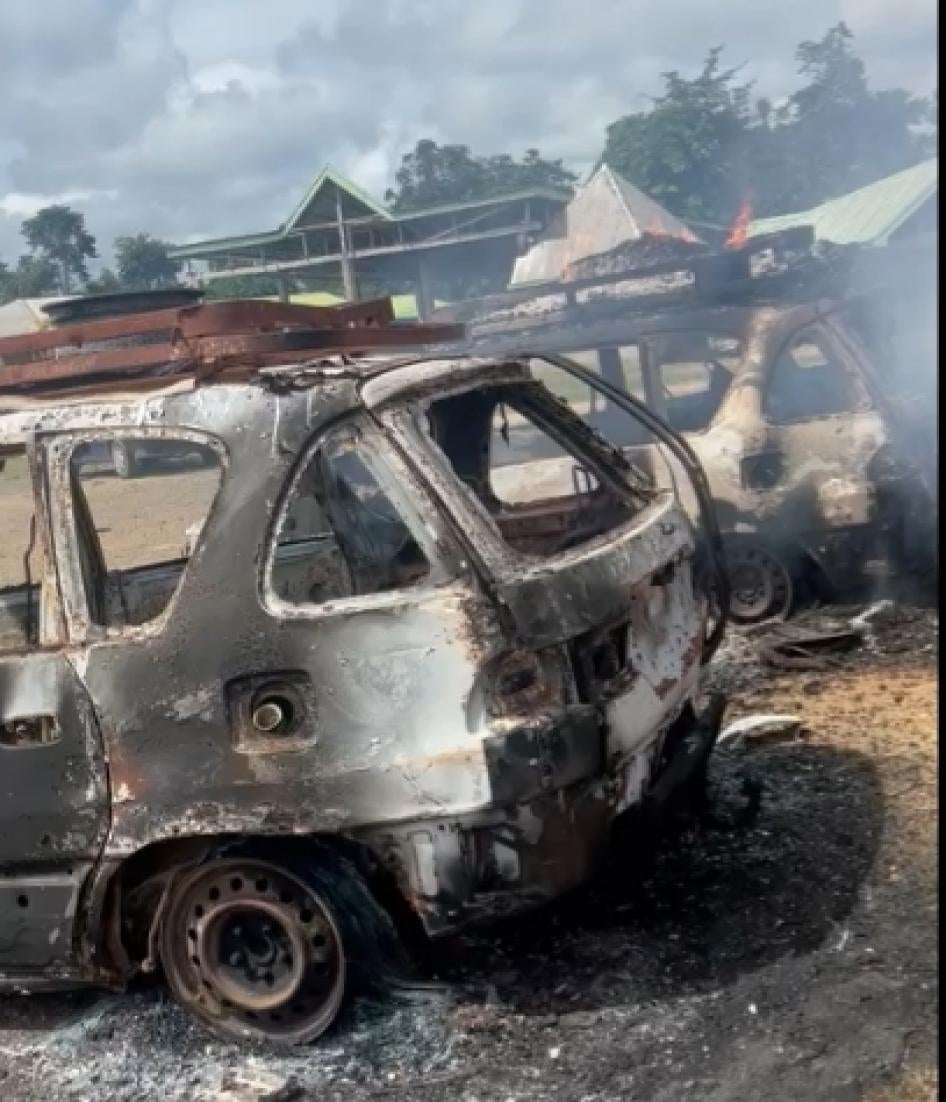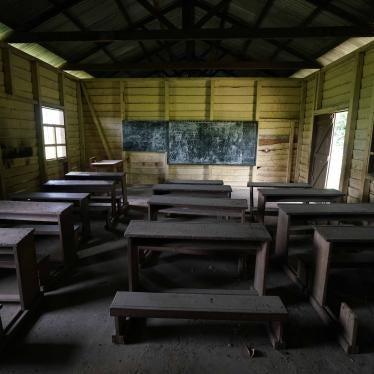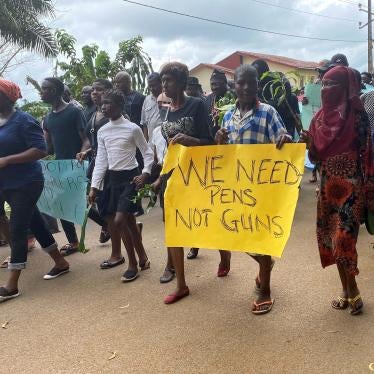(Nairobi) – Armed separatist fighters have killed at least seven people, injured six others, raped a girl, and committed other grave human rights abuses across Cameroon’s Anglophone regions since January 2022, Human Rights Watch said today. In an uptick of violence, the separatists have also burned at least 2 schools, attacked a university, kidnapped up to 82 people, including 33 students and 5 teachers, and threatened and beat 11 students.
“Armed separatist groups are kidnapping, terrorizing, and killing civilians across the English-speaking regions with no apparent fear of being held to account by either their own leaders or Cameroonian law enforcement” said Ilaria Allegrozzi, senior central Africa researcher at Human Rights Watch. “Leaders of separatist groups should immediately instruct their fighters to stop abusing civilians and hand over abusive fighters for prosecution.”
Between April 1 and June 15, Human Rights Watch interviewed 38 people by telephone, including 27 victims and witnesses to separatist abuses, 3 relatives of victims, 4 Cameroonian journalists, and 4 members of Cameroonian human rights organizations. Human Rights Watch also reviewed medical records, 13 videos, and 56 photographs shared directly with Human Rights Watch researchers or posted on social media showing evidence of separatist abuses.
Between May 1 and 10, Human Rights Watch shared its findings with representatives of three major separatist groups: the spokesperson of the Ambazonia Interim Government (Sako), Christopher Anu, and the vice-president of the Ambazonia Interim Government (Sisiku), Dabney Yerima; the defense chief of the Ambazonia Defense Forces (ADF), Capo Daniel; and the chairman of the African People’s Liberation Movement (APLM), Ebenezer Derek Mbongo Akwanga. Only Daniel responded.
On April 5, separatists stormed the campus of the Bamenda university, in Bambili, North-West region, shooting in the air, causing panic among students and teachers, and leading to a stampede that injured at least five people. The fighters attacked the university for not observing a “lockdown,” or stay-at-home order, that they had declared across the area. Fighting to create an independent Anglophone state of “Ambazonia” since 2016, separatists target civilians who do not observe their calls for school boycotts or general lockdowns. These abusive calls trample the basic rights of an already terrorized civilian population, and separatist fighters and their leaders should be held accountable and punished for their violent enforcement, Human Rights Watch said.
Human Rights Watch spoke to five witnesses of the attack against the Bamenda university, consulted local media reports on the incident, and reviewed a 15-second video filmed at the campus on the day of the attack that showed students fleeing after hearing gunshots.
“I saw three separatist fighters shooting from the campus football field,” a 28-year-old student told Human Rights Watch. “I was less than 50 meters from them. They kept firing for 20 minutes.”
Witnesses said that there was sustained gunfire for about 25 minutes as gendarmes responded. Residents of Bambili said fighters belonging to the separatist group Restoration Forces have their camp in Fonyah, less than 6 kilometers away from the campus.
It is not the first time that separatist fighters attack the Bamenda university. Human Rights Watch documented separatists storming a campus dormitory on May 20, 2020, kidnapping nine students. The separatists took the students to their camp, beat them, and held them for five days, until a ransom was paid.
On February 26, at about 3 p.m., separatist fighters stopped two vehicles from the Cameroon Baptist Convention Health Services (CBCHS), a nonprofit medical organization, at a checkpoint in Mile 90, North-West region. They fired at one vehicle, killing Jenette Sweyah Shey, a 46-year-old female nurse, and injuring another female nurse and a male doctor. The medical workers were returning from Ashong and Nyonga, two localities where CBCHS had provided health assistance to people in need.
Human Rights Watch spoke to four people, including two CBCHS staff, a female nurse who witnessed the killing, and a man who saw Shey’s body. “They [separatist fighters] shot at the windscreen of the first vehicle,” the nurse said. “The bullet went through and hit Jenette in the forehead. She died as we rushed her to the hospital.”
Daniel, the deputy defense chief of the ADF, said that ADF fighters and fighters from another group, The Buffaloes of Bali, were at the checkpoint at the time, that “it was a case of mistaken identity,” and that “we have apologized with CBCHS” for the incident.
On February 28, the United Nations humanitarian coordinator in Cameroon released a statement which condemned the killing of the nurse and called on the killers “to refrain from hindering access to medical services.” In a March 18 statement, the CBCHS provided information on the incident and said that “Shey lost her life in the process of saving lives.”
Security forces and armed separatists have both attacked hospitals and medical staff across the Anglophone regions since 2017. On July 6, 2020, separatists killed a Médecins Sans Frontières (MSF, or Doctors without Borders) community health worker in the South-West region, after accusing him of collaborating with the military. On June 10, suspected separatist fighters burned down the district hospital in Mamfe, South-West region, depriving 85,000 people of access to health care, the United Nations Office for the Coordination of Humanitarian Affairs in Cameroon reported.
During an attack on May 16 on a residential area in Idenau, South-West region, where workers of the Cameroon Development Corporation (CDC), a public agribusiness company, live, separatist fighters abducted 30 people, and one fighter raped a girl in her early teens.
On April 7, armed separatists kidnapped 33 seminary students for ransom in Bachuo-Ntai, South-West region. Catholic church authorities told the media that the students were released the following day. It is unclear whether a ransom was paid.
On May 30, local media reported that the body of Lukong Francis, a retired teacher at the government high school in Jakiri, North-West region, and a member of the ruling party, was found on May 23 on the road between Mantum and Jakiri with signs of torture. Local teachers and Francis’s former colleagues confirmed to Human Rights Watch that Francis had been kidnapped by suspected separatist fighters in retaliation for participating in the May 20 public celebrations for Cameroon’s Unity Day, which separatist groups oppose.
Since 2017, armed separatists have kidnapped hundreds of people, including students, teachers, medical staff, humanitarian workers, clergy, and government officials. They have also killed and tortured civilians, and carried out widespread attacks on education. They have also intimidated human rights defenders, including Akem Kelvin Nkwain, member of prominent human rights group Centre for Human Rights and Democracy in Africa.
Government troops have also committed human rights violations, including extensive burning of villages, homes, and shops, killings, torture, mistreatment, incommunicado detention, and rape of civilians.
“Cameroon’s regional and international partners should intensify calls on the Cameroonian government for accountability, and better protection of civilians,” Allegrozzi said. “They should also impose targeted sanctions, such as travel bans and asset freezes, on separatist leaders who bear responsibility for committing abuses.”
For more details on recent abuses and accounts from victims and witnesses, please see below.
Multiple Attacks, Buea, South-West Region
Separatist fighters, vowing to disrupt Africa' s soccer tournament, the Africa Cup of Nations (AFCON), which was held in Cameroon between January 9 and February 6, carried out a series of attacks in the town of Buea on January 12, when national soccer teams were training in the town. The separatists declared a lockdown and apparently punished people who did not observe it, as the following three incidents that all took place on January 12 suggest.
Assault, Threats, Injury of Students
Separatist fighters physically assaulted, threatened, and humiliated a group of 11 students, including at least 4 girls, aged from 14 to 18, who were on their way to the Bokova high school on January 12. They shot one of the students in the right leg and seized or destroyed the students’ school material.
Human Rights Watch spoke to an official of the victims’ school and two victims and reviewed a video showing at least one fighter with a gun beating two students, one male and one female, and the eleven students being ordered to strip naked. In the video, which the school official and students confirmed was genuine and which also circulated on social media, the separatist fighters can be heard threatening to kill any student who disobeys their orders.
A 16-year-old female student who was among the victims said:
They were about 15 separatists, they ordered us to remove our school uniforms. As we were all naked, they beat us, kicked us, and threatened to kill us. They said schools should be shut down. They shot my friend in his leg from close range. I was terrified.
The school official said that following the incident, the students were traumatized and did not come to school for over a week.
In a January 13 radio statement, an army spokesperson, Cyrille Serge Atonfack Guemo, blamed separatist fighters for the attack. In a January 14 video shared on YouTube, Daniel, the ADF deputy defense chief, congratulated fighters from the group known as The Mountain Lions for the attack against students but said students should have not been stripped naked.
Killing of Civilians
Separatist fighters shot and killed a 30-year-old male taxi driver and another man at Bwitingi market area on January 12.
Human Rights Watch spoke to a witness of the killing and three people who saw the bodies, including a relative of one of the victims. Human Rights Watch also reviewed six photographs showing the taxi driver’s body at the Buea hospital mortuary and five photographs showing the taxi after the attack.
A witness said:
I was hiding behind a building. I saw how separatist fighters stopped a taxi and fired at it several times. I don’t know what happened. That day was a “ghost-town day” because of AFCON. When the situation calmed down, I rushed to the scene only to find the bodies of the driver and his passenger drilled by bullets.
The family of the taxi driver did not file any complaint with state authorities out of fear of retaliation.
Shooting of a Lawyer
Armed separatist fighters shot a lawyer in both his legs and stomach at the checkpoint area near Bwitingi market on January 12. The fighters stopped his car, ordered him out of the car and shot him at close range. “I saw amba [separatist fighters] stopping his car,” a witness said. “As he got out, they shot him at least five times. It was brutal.”
Human Rights Watch also spoke with a friend of the lawyer who visited him at the Buea general hospital and reviewed a report by a local human rights organization that documented the incident, three photographs depicting the injuries suffered by the barrister, and a video filmed in the aftermath of the incident showing him covered in blood.
The lawyer is still undergoing medical treatment for his injuries.
Kidnapping of Workers in Tiko and Idenau, South-West Region, and Rape of a Girl
On January 13, separatist fighters attacked a rubber estate plantation of the CDC in Tiko, abducted nine workers, including six women, and set a tractor ablaze. “They had guns, invaded the plantation and took us away,” one of the abductees, a man, said. “They threatened to kill us if we kept working for the CDC and said we should instead join their struggle.” The workers were all released on January 25 following a ransom payment.
On May 16, separatist fighters from the group known as “Ten Cobo” attacked a CDC residential area in Idenau, went house-to-house and abducted thirty people, including five women and an old man. Nine workers eventually escaped. Separatists beat and threatened the remaining captives with harm, then abandoned them two days later. During the attack at the residential area, a separatist fighter also raped a girl in her early teens.
Human Rights Watch reviewed international and local media reports on the incident, spoke with two of the abductees, a relative of the rape survivor, and a journalist who covered the case.
A 37-year-old woman who was among the abductees said:
We had to walk all night before reaching their camp. Some of us, especially the elderly, were exhausted. They beat us on the soles of our feet with machetes. They shaved my hair as a punishment. They said we should not go back to work and CDC should be shut down.
A relative of the rape survivor said: “I found her in a lot of pain. I took her to the CDC clinic, where she was treated. She’s traumatized.”
Since 2018, separatist groups have attacked and kidnapped scores of CDC workers in efforts to paralyze the country’s economy. CDC is the second largest employer in Cameroon and runs banana, palm oil, and rubber plantations in the South-West region. Human Rights Watch has documented at least three incidents involving CDC workers who were beaten or maimed, and in one case, shot by separatist fighters in 2018.
Kidnapping of Lawyers For Ransom, North-West Region
On January 16, separatist fighters kidnapped a lawyer from his home in Bamenda in the presence of his family. They blindfolded him, took him to their camp, and threatened him with death. They released him four hours later following a ransom payment of 2.3 million CFA (US$3,700). The lawyer said:
Two separatist fighters with rifles broke into my home. ‘On the floor or I’ll shoot you’, one shouted. My wife and kids were present and terrified. They told me lawyers are traitors … They said I better pay the ransom if I don’t want to end up like barrister Kemende.
The lawyer said that his abductors alleged that they had kidnapped an opposition senator and barrister, Henry Kemende, and killed him because he did not pay the ransom. The lawyer also said he saw Kemende’s car at the separatists’ camp where he was held. Human Rights Watch was unable to verify this information.
The kidnapping and killing of Kemende, a member from the opposition party Social Democratic Front (SDF), prompted a national and international outcry. Human Rights Watch has documented how separatist fighters repeatedly targeted SDF members and supporters since 2019, including his leader John Fru Ndi, accusing them of not supporting their struggle for independence.
The kidnapped lawyer said he filed a complaint at the Bamenda police on January 18, but as of early June there has been no progress in an investigation.
On May 29, separatist fighters kidnapped Valentine Velieh Yenshia, a 54-year-old male lawyer, from his farm in Babanki. They kept him in isolation in a container for three days without food and threatened him with harm, then released him on June 2 following a ransom payment of 1.1 million CFA ($1,700). The lawyer said that on June 2, he filed a complaint at Bamenda senior state counsel. He also said that he continues to receive threats of harm from separatist fighters.
Kidnapping of Teachers, Injuring of Students, Weh, North-West Region
On January 19, a group of seven separatist fighters attacked the government high school, in Weh at about 8:30 am, abducting five teachers, including two women, and injuring two students, one of whom was 14.
Human Rights Watch spoke with two of the kidnapped teachers and one of the injured students. Human Rights Watch also reviewed three photographs of the students’ wounds and their medical records.
The two teachers said that the separatist fighters, some of whom they recognized as their former students, told them that they were being kidnapped for not complying with the separatist-ordered school boycott and for not contributing financially to their struggle for independence. One said:
I was in class with twenty-seven students when separatist fighters broke in. They forced us out at gunpoint. Students panicked and ran away. I was taken away with four other teachers. We had to walk for an entire day in the bush until we reached their camp. The female teacher and an elderly teacher were exhausted and struggled to keep walking. But the fighters threatened them with death if they didn’t continue. They said government schools should be shut down.
One of the injured students said: “They wanted to kidnap me, but I resisted, so one of the fighters cut off a finger with a machete. I screamed in pain. He let me go. I went to the hospital where I underwent surgery, but my finger was finally amputated.”
The teachers were released on January 24 following a ransom payment. The incident, teachers said, caused the closure of all schools in Weh for one week.
Witnesses said that no security forces were near the school at the time of the attack. Teachers and Weh residents said that there is a military base in Weh, about 2 kilometers from the school, but that soldiers and gendarmes based there have no means of transportation, limiting their ability to patrol and secure the area.
Arson Attacks on Primary School, Buea, South-West Region
In the early morning of February 7, suspected separatist fighters burned a classroom of a government primary school in Molyko group 1.
Human Rights Watch reviewed credible media reports about the incident, interviewed two people who went to the school the following morning, and examined 10 photographs showing damages caused by the fire. “I saw an entire classroom burned with everything inside,” a journalist said. “Gendarmes outside the school said they intervened to chase the separatists away but did not catch them. Teachers said it was not the first time the school had been targeted and they had received threats by separatists to shut down the school.”
On April 5, another classroom of the school was burned. Human Rights Watch spoke to a man who saw the classroom on fire, to a journalist who visited the school on April 6, and reviewed three photographs showing damages caused by the fire.
Arson Attack on Queen of the Rosary College, Okoyong, South-West Region
On February 11, between 2 and 2:30 a.m., separatist fighters set fire to three dormitories of an all-girls boarding secondary school. Human Rights Watch reviewed media and reports by nongovernmental groups on the incident, spoke to a school official and a student who witnessed the attack, reviewed three videos showing the dormitories on fire, and five photographs depicting the aftermath of the arson attack. In the videos, which the school official confirmed was authentic, students can be heard screaming as fighters threaten students not to march on February 11, observed as a national youth day in Cameroon with traditional students’ parades. The school official said:
The attack unfolded as the kids were asleep. There were 120 girls in the dormitories. We heard screaming and saw smoke and flames. Girls ran away as arsonists burned down their beds and personal belongings. Some students sustained light injuries.
The school official said that soldiers and the Okoyong mayor visited the college the morning following the attack promising an investigation. However, it is unclear whether an investigation was opened.
The arson attack was condemned nationally and internationally. On February 14, diplomats in Cameroon, including from Canada, Norway, South Africa, Switzerland, the United Kingdom, and the United States issued a joint statement calling on all stakeholders to the Anglophone crisis to respect the right to education, and stop attacking schools.
In a February 11 statement, Dabney Yerima, the vice president of separatist group Sako, acknowledged separatist responsibility for the attack and said his group will “take steps to disarm rogue gangs operating within Ambazonia.”
Attack in Mamfe, South-West Region
On April 28, separatist fighters attacked the taxi and bus station known as “moto-park” at about 1 a.m. They burned at least five cars and allegedly killed three men, including a teacher, a driver, and a porter, accusing station workers of operating during their declared lockdown. Human Rights Watch reviewed local media reports on the incident and spoke to three people, including a witness to the attack and two family members of two of the victims. Human Rights Watch also reviewed a photograph showing one of the burned cars and a photograph showing the body of one of the three men. A 24-year-old student said:
I was in a taxi waiting to leave when I heard gunshots. I got out the car and saw a group of amba [separatist fighters]. I hid behind a bush. I saw them burning the taxi and four other cars. They accused people of not respecting their orders to stay home on Mondays. I saw them shooting randomly. When they left, I saw the body of a man who had been killed, a loader [porter]
The brother of the driver who was killed said: “I saw the body of my brother at the mortuary. He had three gunshot wounds. He was shot from behind and the bullets came out from the chest.”
Kidnapping of Senator and Her Driver, Bamenda, North-West Region
On April 30, ADF fighters kidnapped a ruling party senator, Regina Mundi, along with her driver in Bamenda. Human Rights Watch reviewed local and international media reports on the incident and a May 1 video which circulated on social media showing the senator in an unknown location with ADF paraphernalia behind her, making a pro-separatist statement.
Daniel, the ADF deputy defense chief, confirmed the authenticity of the video and said that the ADF “arrested the senator for high treason” adding that she will be used for an exchange of prisoners.
In a May 11 YouTube video, Daniel said ADF were preparing to execute Mundi if President Biya did not release Anglophone prisoners. In a May 31 release, the army spokesperson Atonfack announced that on May 30, soldiers freed Mundi and “several” other hostages in Ashong, North-West region.
Attempted Kidnapping of Journalist, Bamenda, North-West Region
On May 26, at about 6 p.m., at least six heavily armed separatist fighters robbed and attempted to kidnap Frédéric Takang, BBC’s Cameroon correspondent, from the streets in Bamenda. Human Rights Watch spoke to the journalist who said:
They fired in the air to scare people around. They robbed me of everything. They took my car, my computer, my microphone, my money and telephone. They also stole money and other items from at least 10 other people who were there. They said they were going to kidnap me, take me to their camp because they wanted me to deliver a message. They didn’t say which message. Then, one of them took me away on his motorbike. On the way, I managed to push him off the motorbike and escape.
On May 26, Takang filed a criminal complaint with the gendarmerie in Bamenda, but as of mid-June he had not been informed of any progress in the investigation.
